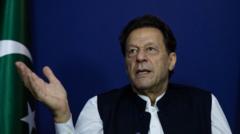Why Have Authorities Jailed 108 Members of Imran Khan's Party?

Understanding the Political Turmoil in Pakistan: A Deep Dive into Recent Events
The political landscape in Pakistan has been marked by significant upheaval, particularly following the arrest of former Prime Minister Imran Khan in May 2023. The subsequent violent protests and the recent sentencing of members from Khan's Pakistan Tehreek-e-Insaf (PTI) party illustrate the growing tensions between political factions and the military establishment. In this article, we will explore the key events leading up to these developments, the implications for democracy in Pakistan, and the broader context of political dissent in the country.
The Arrest of Imran Khan: Catalyst for Unrest
Imran Khan, once celebrated as a cricketing hero turned politician, was arrested during a court appearance related to corruption charges on May 9, 2023. His arrest triggered immediate backlash from his supporters, leading to widespread protests across the nation. Thousands of Khan's followers took to the streets, demanding his release and expressing their discontent with the military's involvement in civilian governance.
The protests escalated into violent confrontations with security forces, resulting in significant casualties and property damage. Reports indicated that at least ten individuals lost their lives during these clashes, which further intensified public outrage against the government and military. The heavy-handed response from authorities aimed to quell the unrest, but it only fueled the fire of dissent among Khan's supporters.
Sentencing of PTI Members: A Blow to Opposition
In a recent development, the anti-terrorism court sentenced 108 members of the PTI party, including prominent figures like opposition leader Omar Ayub Khan, to prison terms ranging up to ten years. This decision marks a critical moment in Pakistan's political history, as it showcases the lengths to which authorities are willing to go to suppress dissent and maintain control over the political narrative.
The PTI has vehemently criticized these convictions, describing them as politically motivated attempts to silence opposition voices. The party's statement on social media platform X asserted that this unprecedented legal action against opposition leaders undermines the democratic framework of Pakistan and sets a dangerous precedent for political repression.
Impact on Democratic Institutions
The recent actions against PTI members raise serious questions about the state of democracy in Pakistan. Critics argue that the judiciary has been weaponized against political opponents, eroding public trust in legal institutions. Zulfi Bukhari, Khan's media advisor, described the sentencing as "a black day for democracy," emphasizing that convicting opposition leaders one after another poses a grave threat to the country's fragile democratic system.
The disqualification of six PTI lawmakers from their seats further complicates the political landscape. Such measures not only weaken the opposition but also diminish the representation of diverse viewpoints in Pakistan's National Assembly. As these developments unfold, many citizens are left questioning the integrity of their democratic processes and the potential for political reform.
Imran Khan's Continued Popularity Amidst Challenges
Despite facing over 150 charges, including serious allegations ranging from terrorism to leaking state secrets, Imran Khan continues to enjoy substantial support among the Pakistani populace. His political narrative resonates with many, who view him as a symbol of resistance against political oppression and military intervention.
This enduring popularity may be attributed to Khan's charisma, his previous governance efforts, and a public sentiment that perceives the charges against him as a politically motivated crackdown. His supporters argue that the military's actions are an attempt to curtail democratic freedoms and maintain its influence over Pakistan's political landscape.
The Role of the Military in Politics
The military has historically played a significant role in Pakistan's governance, often intervening in civilian affairs to maintain stability. However, the current political unrest highlights the complex relationship between civilian leadership and military authority. Many analysts suggest that the military's involvement in political matters has contributed to a cycle of instability, where civilian governments struggle to establish legitimacy and autonomy.
As the political situation evolves, it is crucial for both the military and civilian leaders to engage in dialogue and explore avenues for reconciliation. Failure to address the underlying issues may lead to further unrest and a deepening crisis in governance.
Looking Ahead: The Future of PTI and Democracy in Pakistan
As the PTI navigates the aftermath of recent convictions, the party has expressed its intention to challenge the verdicts in court. This legal battle represents not only a fight for the rights of its members but also a broader struggle for democratic principles within Pakistan. The outcome of these challenges could significantly influence the political trajectory of the country heading into the 2024 National Assembly elections.
During the 2024 elections, PTI members running as independent candidates had previously secured the most seats but faced obstacles in forming a government. This scenario underscores the contentious nature of Pakistan's electoral landscape, where political alliances and rivalries shape the future of governance.
FAQs About the Political Situation in Pakistan
What led to the violent protests in Pakistan in 2023?
The violent protests erupted following the arrest of former Prime Minister Imran Khan during a court appearance on corruption charges. His supporters took to the streets in large numbers, leading to clashes with security forces.
How many members of the PTI were sentenced recently?
A total of 108 members of the PTI were sentenced to prison terms by an anti-terrorism court, including notable opposition leader Omar Ayub Khan.
What are the implications of these sentences for democracy in Pakistan?
The sentences have raised concerns about political repression and the erosion of democratic institutions in Pakistan. Critics argue that these actions undermine public confidence in the judicial system and weaken the opposition.
Is Imran Khan still popular among the Pakistani people?
Yes, despite facing numerous legal challenges, Imran Khan continues to maintain significant popularity among his supporters, who view him as a figure of resistance against political oppression.
What challenges does the PTI face moving forward?
The PTI faces legal battles, disqualification of its leaders, and a challenging political environment as it seeks to re-establish itself in the lead-up to the National Assembly elections in 2024.
The situation in Pakistan remains fluid, with the potential for further developments that could reshape the political landscape. As citizens watch closely, the question arises: what steps can be taken to restore trust in democratic institutions and ensure a more inclusive political process? #PakistanPolitics #ImranKhan #Democracy
Published: 2025-08-01 03:56:10 | Category: technology



